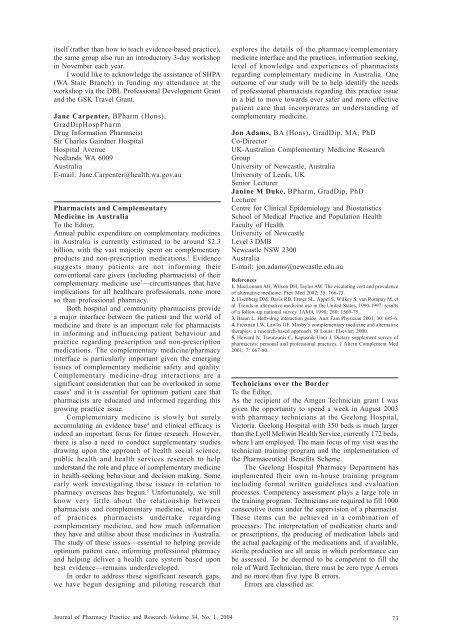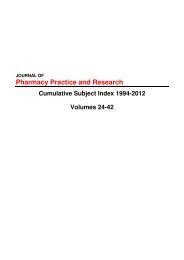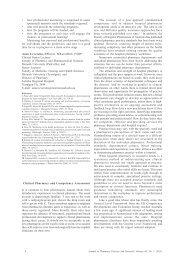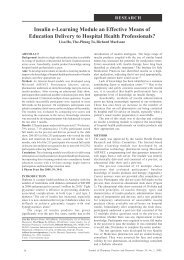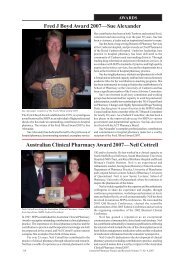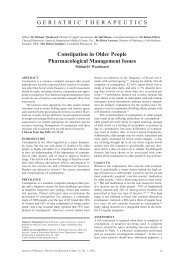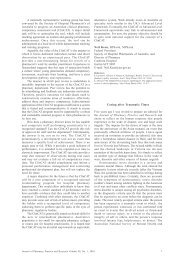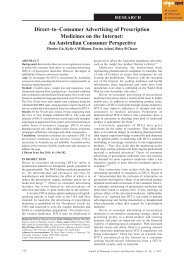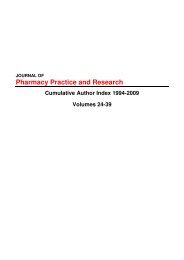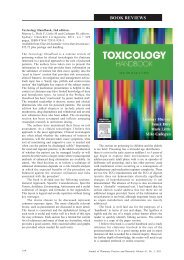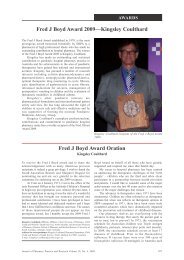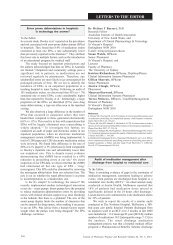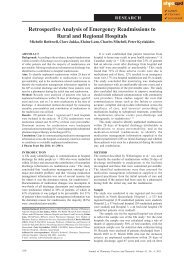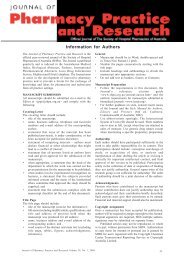Technicians over the border. - jppr - The Society of Hospital ...
Technicians over the border. - jppr - The Society of Hospital ...
Technicians over the border. - jppr - The Society of Hospital ...
You also want an ePaper? Increase the reach of your titles
YUMPU automatically turns print PDFs into web optimized ePapers that Google loves.
itself (ra<strong>the</strong>r than how to teach evidence-based practice),<br />
<strong>the</strong> same group also run an introductory 3-day workshop<br />
in November each year.<br />
I would like to acknowledge <strong>the</strong> assistance <strong>of</strong> SHPA<br />
(WA State Branch) in funding my attendance at <strong>the</strong><br />
workshop via <strong>the</strong> DBL Pr<strong>of</strong>essional Development Grant<br />
and <strong>the</strong> GSK Travel Grant.<br />
Jane Carpenter, BPharm (Hons),<br />
GradDipHospPharm<br />
Drug Information Pharmacist<br />
Sir Charles Gairdner <strong>Hospital</strong><br />
<strong>Hospital</strong> Avenue<br />
Nedlands WA 6009<br />
Australia<br />
E-mail: Jane.Carpenter@health.wa.gov.au<br />
Pharmacists and Complementary<br />
Medicine in Australia<br />
To <strong>the</strong> Editor,<br />
Annual public expenditure on complementary medicines<br />
in Australia is currently estimated to be around $2.3<br />
billion, with <strong>the</strong> vast majority spent on complementary<br />
products and non-prescription medications. 1 Evidence<br />
suggests many patients are not informing <strong>the</strong>ir<br />
conventional care givers (including pharmacists) <strong>of</strong> <strong>the</strong>ir<br />
complementary medicine use 2 —circumstances that have<br />
implications for all healthcare pr<strong>of</strong>essionals, none more<br />
so than pr<strong>of</strong>essional pharmacy.<br />
Both hospital and community pharmacists provide<br />
a major interface between <strong>the</strong> patient and <strong>the</strong> world <strong>of</strong><br />
medicine and <strong>the</strong>re is an important role for pharmacists<br />
in informing and influencing patient behaviour and<br />
practice regarding prescription and non-prescription<br />
medications. <strong>The</strong> complementary medicine/pharmacy<br />
interface is particularly important given <strong>the</strong> emerging<br />
issues <strong>of</strong> complementary medicine safety and quality.<br />
Complementary medicine-drug interactions are a<br />
significant consideration that can be <strong>over</strong>looked in some<br />
cases 3 and it is essential for optimum patient care that<br />
pharmacists are educated and informed regarding this<br />
growing practice issue.<br />
Complementary medicine is slowly but surely<br />
accumulating an evidence base 4 and clinical efficacy is<br />
indeed an important focus for future research. However,<br />
<strong>the</strong>re is also a need to conduct supplementary studies<br />
drawing upon <strong>the</strong> approach <strong>of</strong> health social science,<br />
public health and health services research to help<br />
understand <strong>the</strong> role and place <strong>of</strong> complementary medicine<br />
in health-seeking behaviour and decision making. Some<br />
early work investigating <strong>the</strong>se issues in relation to<br />
pharmacy <strong>over</strong>seas has begun. 5 Unfortunately, we still<br />
know very little about <strong>the</strong> relationship between<br />
pharmacists and complementary medicine, what types<br />
<strong>of</strong> practices pharmacists undertake regarding<br />
complementary medicine, and how much information<br />
<strong>the</strong>y have and utilise about <strong>the</strong>se medicines in Australia.<br />
<strong>The</strong> study <strong>of</strong> <strong>the</strong>se issues—essential to helping provide<br />
optimum patient care, informing pr<strong>of</strong>essional pharmacy<br />
and helping deliver a health care system based upon<br />
best evidence—remains underdeveloped.<br />
In order to address <strong>the</strong>se significant research gaps,<br />
we have begun designing and piloting research that<br />
explores <strong>the</strong> details <strong>of</strong> <strong>the</strong> pharmacy/complementary<br />
medicine interface and <strong>the</strong> practices, information seeking,<br />
level <strong>of</strong> knowledge and experiences <strong>of</strong> pharmacists<br />
regarding complementary medicine in Australia. One<br />
outcome <strong>of</strong> our study will be to help identify <strong>the</strong> needs<br />
<strong>of</strong> pr<strong>of</strong>essional pharmacists regarding this practice issue<br />
in a bid to move towards ever safer and more effective<br />
patient care that incorporates an understanding <strong>of</strong><br />
complementary medicine.<br />
Jon Adams, BA (Hons), GradDip, MA, PhD<br />
Co-Director<br />
UK-Australian Complementary Medicine Research<br />
Group<br />
University <strong>of</strong> Newcastle, Australia<br />
University <strong>of</strong> Leeds, UK<br />
Senior Lecturer<br />
Janine M Duke, BPharm, GradDip, PhD<br />
Lecturer<br />
Centre for Clinical Epidemiology and Biostatistics<br />
School <strong>of</strong> Medical Practice and Population Health<br />
Faculty <strong>of</strong> Health<br />
University <strong>of</strong> Newcastle<br />
Level 3 DMB<br />
Newcastle NSW 2300<br />
Australia<br />
E-mail: jon.adams@newcastle.edu.au<br />
References<br />
1. MacLennan AH, Wilson DH, Taylor AW. <strong>The</strong> escalating cost and prevalence<br />
<strong>of</strong> alternative medicine. Prev Med 2002; 35: 166-73.<br />
2. Eisenberg DM, Davis RB, Ettner SL, Appel S, Wilkey S, van Rompay M, et<br />
al. Trends in alternative medicine use in <strong>the</strong> United States, 1990-1997: results<br />
<strong>of</strong> a follow-up national survey. JAMA 1998; 280: 1569-75.<br />
3. Braun L. Herb-drug interaction guide. Aust Fam Physician 2001; 30: 685-6.<br />
4. Freeman LW, Lawlis GF. Mosby’s complementary medicine and alternative<br />
<strong>the</strong>rapies: a research-based approach. St Louis: Elsevier; 2000.<br />
5. Howard N, Tsourounis C, Kapusnik-Uner J. Dietary supplement survey <strong>of</strong><br />
pharmacists: personal and pr<strong>of</strong>essional practices. J Altern Complement Med<br />
2001; 7: 667-80.<br />
<strong>Technicians</strong> <strong>over</strong> <strong>the</strong> Border<br />
To <strong>the</strong> Editor,<br />
As <strong>the</strong> recipient <strong>of</strong> <strong>the</strong> Amgen Technician grant I was<br />
given <strong>the</strong> opportunity to spend a week in August 2003<br />
with pharmacy technicians at <strong>the</strong> Geelong <strong>Hospital</strong>,<br />
Victoria. Geelong <strong>Hospital</strong> with 350 beds is much larger<br />
than <strong>the</strong> Lyell McEwin Health Service, currently 172 beds,<br />
where I am employed. <strong>The</strong> main focus <strong>of</strong> my visit was <strong>the</strong><br />
technician training program and <strong>the</strong> implementation <strong>of</strong><br />
<strong>the</strong> Pharmaceutical Benefits Scheme.<br />
<strong>The</strong> Geelong <strong>Hospital</strong> Pharmacy Department has<br />
implemented <strong>the</strong>ir own in-house training program<br />
including formal written guidelines and evaluation<br />
processes. Competency assessment plays a large role in<br />
<strong>the</strong> training program. <strong>Technicians</strong> are required to fill 1000<br />
consecutive items under <strong>the</strong> supervision <strong>of</strong> a pharmacist.<br />
<strong>The</strong>se items can be achieved in a combination <strong>of</strong><br />
processes. <strong>The</strong> interpretation <strong>of</strong> medication charts and/<br />
or prescriptions, <strong>the</strong> producing <strong>of</strong> medication labels and<br />
<strong>the</strong> actual packaging <strong>of</strong> <strong>the</strong> medications and, if available,<br />
sterile production are all areas in which performance can<br />
be assessed. To be deemed to be competent to fill <strong>the</strong><br />
role <strong>of</strong> Ward Technician, <strong>the</strong>re must be zero type A errors<br />
and no more than five type B errors.<br />
Errors are classified as:<br />
Journal <strong>of</strong> Pharmacy Practice and Research Volume 34, No. 1, 2004 73
Type A: Incorrect drug, incorrect strength <strong>of</strong> drug,<br />
incorrect dose form/formulation. Incorrect storage<br />
conditions and any drug missing and not readily<br />
available after hours.<br />
Type B: Unnecessary drug, inadequate quantities,<br />
drug missing but readily accessed from an after hours<br />
area or an alternative ward.<br />
<strong>Technicians</strong> are assessed for competency<br />
approximately every six months by a pharmacist randomly<br />
selecting and reviewing 100 items.<br />
Formalisation <strong>of</strong> training for technicians is yet to be<br />
implemented in Australia. Currently in South Australia<br />
<strong>the</strong> availability <strong>of</strong> certificates III and IV and/or a diploma<br />
are being considered. Suggestions are also being made<br />
for changes in legislation to enable technicians to<br />
dispense with checking by o<strong>the</strong>r technicians, following<br />
pre-checking <strong>of</strong> <strong>the</strong> order by a pharmacist.<br />
As discussions are currently in progress for <strong>the</strong><br />
possible introduction <strong>of</strong> <strong>the</strong> Pharmaceutical Benefits<br />
Scheme to a number <strong>of</strong> hospitals in South Australia, <strong>the</strong><br />
implementation <strong>of</strong> <strong>the</strong> Pharmaceutical Benefits Scheme<br />
at <strong>the</strong> Geelong <strong>Hospital</strong> was <strong>of</strong> great interest to all staff at<br />
<strong>the</strong> Lyell McEwin Pharmacy Department. From my<br />
observations, <strong>the</strong> Pharmaceutical Benefits Scheme <strong>of</strong>fered<br />
a number <strong>of</strong> advantages with <strong>the</strong> most obvious being<br />
that patients are issued with a minimum <strong>of</strong> one month<br />
supply <strong>of</strong> medications c<strong>over</strong>ed by <strong>the</strong> Pharmaceutical<br />
Benefits Scheme, and also <strong>the</strong> ability <strong>of</strong> <strong>the</strong> pharmacy to<br />
claim for reimbursement <strong>of</strong> medication costs through <strong>the</strong><br />
scheme. <strong>The</strong> major disadvantage appeared to be <strong>the</strong><br />
increase in record keeping. <strong>The</strong> administrative side <strong>of</strong><br />
<strong>the</strong> Pharmaceutical Benefits Scheme appeared to be fairly<br />
involved which made me aware that <strong>the</strong> issue <strong>of</strong> an<br />
increase in staffing would need to be addressed if <strong>the</strong><br />
scheme was implemented. However, many <strong>of</strong> <strong>the</strong> problems<br />
observed were minor and I feel could be dealt with by <strong>the</strong><br />
provision <strong>of</strong> training and advice.<br />
During <strong>the</strong> week I spent at <strong>the</strong> Geelong Pharmacy, I<br />
gained valuable insight into a number <strong>of</strong> areas <strong>of</strong> <strong>the</strong><br />
Pharmaceutical Benefits Scheme and I feel that I have a<br />
much clearer idea <strong>of</strong> <strong>the</strong> process and issues. In addition,<br />
formalisation <strong>of</strong> a training regime for technicians is currently<br />
in <strong>the</strong> process <strong>of</strong> being addressed in South Australia, and<br />
I hope that <strong>the</strong> knowledge and understanding <strong>of</strong> o<strong>the</strong>r<br />
hospital regimes gained at Geelong will enable me to<br />
contribute to this process in my hospital and state.<br />
I would like to express my appreciation to Amgen for<br />
<strong>the</strong> opportunity to interact, discuss and thoroughly enjoy<br />
<strong>the</strong> time spent in <strong>the</strong> Geelong <strong>Hospital</strong> Pharmacy<br />
Department. Additionally, my thanks go to <strong>the</strong> SHPA for<br />
<strong>the</strong> advice and guidance I received while applying for<br />
<strong>the</strong> Technician Grant. My thanks and appreciation also<br />
go to <strong>the</strong> many staff at Geelong who allowed me to watch<br />
and learn how <strong>the</strong>y carried out daily duties, patiently<br />
answered my many questions and made me feel welcome.<br />
Sandy Bollenhagen<br />
Senior Pharmacy Technician<br />
Pharmacy Department<br />
Lyell McEwin Health Service<br />
Haydown Road<br />
Elizabeth Vale SA 5112<br />
Australia<br />
E-mail: Sandra.Bollenhagen@nwahs.sa.gov.au<br />
Medimate: Medicines without <strong>the</strong> Mix-ups<br />
To <strong>the</strong> Editor,<br />
Early in 2004 <strong>the</strong> <strong>Society</strong> <strong>of</strong> <strong>Hospital</strong> Pharmacists <strong>of</strong><br />
Australia (SHPA) and <strong>the</strong> National Prescribing Service<br />
(NPS) sent a letter to all hospital pharmacists to inform<br />
<strong>the</strong>m about <strong>the</strong> Community Quality Use <strong>of</strong> Medicines<br />
Program. This is a new NPS program to help consumers<br />
better understand <strong>the</strong>ir medicines.<br />
Bulk supplies <strong>of</strong> Medimate (<strong>the</strong> brochure for <strong>the</strong><br />
program) were also sent to hospital pharmacy<br />
departments in mid-January. However, we have heard that<br />
many <strong>of</strong> <strong>the</strong>se have not been received.<br />
SHPA and NPS encourage pharmacists to provide<br />
Medimate to inpatients at risk <strong>of</strong> medication misadventure,<br />
patients about to be discharged, outpatients, and patients<br />
in emergency departments. Medimate may usefully<br />
accompany hospital computer-generated (or pharmacist<br />
written) medicines lists that are prepared for individual<br />
consumers.<br />
Medimate can be ordered from <strong>the</strong> specific web site<br />
. Simply give your details and<br />
<strong>the</strong> number required.<br />
NPS has also received feedback from SHPA regarding<br />
Medimate for future consideration. This includes:<br />
addressing <strong>the</strong> issue about a medicine name versus<br />
brand;<br />
highlighting issues relating to allergies and previous<br />
adverse reactions to medicines;<br />
ensuring consumers understand that <strong>the</strong> medicines<br />
list can be extended by printing <strong>of</strong>f a page from <strong>the</strong><br />
NPS web site;<br />
ensuring SHPA reviews future drafts.<br />
O<strong>the</strong>r feedback from pharmacists has identified <strong>the</strong><br />
importance <strong>of</strong> increasing <strong>the</strong> space provided for listing<br />
medicines—to ensure that Medimate is actually used and<br />
retained by consumers.<br />
It is pleasing to note that initial results from our<br />
consumer survey, looking at <strong>the</strong> uptake and awareness<br />
<strong>of</strong> this program, are very positive with 58% <strong>of</strong> Australians<br />
aware <strong>of</strong> our key messages. We hope we can continue to<br />
improve this awareness both at <strong>the</strong> national and local<br />
level.<br />
NPS will continue to work with SHPA and we will<br />
keep pharmacists informed about <strong>the</strong> progress <strong>of</strong> this<br />
program via our newsletters and publications, web sites<br />
and via <strong>the</strong> Journal.<br />
If you have any comments or would like more<br />
information please telephone NPS on 02 8217 8700 or email<br />
info@nps.org.au. We look forward to your support.<br />
Lynn Weekes, BPharm, MSc, PhD<br />
Chief Executive Officer<br />
National Prescribing Service Limited<br />
Level 7, 418A Elizabeth Street<br />
Surry Hills NSW 2010<br />
Australia<br />
E-mail: lweekes@nps.org.au


